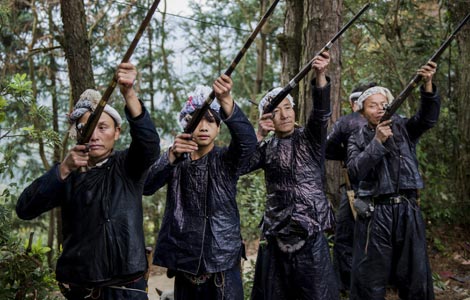Reading China's future through its past
Updated: 2013-12-20 08:01
By Kelly Chung Dawson in New York (China Daily USA)
|
||||||||
Contrary to the popular historical narrative that China's exposure to the West in the 1800s hastened a slew of problems for an inward-looking Qing Dynasty, historian Odd Arne Westad argues that the Qing were not only eager to expand outward but benefited immeasurably from Western creativity and knowledge.
In his new book Restless Empire: China and the World Since 1750, which was recently named winner of the 2013 Asia Society Bernard Schwartz Book Award for its contribution to advancing the understanding of contemporary Asia, Westad traces China's development through its interactions with the outside world from a Chinese perspective.
"There's very little in this book about a supposedly inward-looking China, or an isolated China that is self-satisfied about its past successes, but instead the China I see back then and today is a China that is open to change and always has been," Westad said in remarks at the Asia Society this week.
"China today is a hybrid that's been created as the result of both domestic and foreign influences, to a higher degree than almost any other country. In fact, one of the only other countries that compares is the United States, and more should be made of that comparison, in terms of the restlessness and willingness to embrace change seen in both countries," he explained.
Although he doesn't downplay the wrongdoings inflicted by various Western imperial powers, he does argue that the Western-designated concession districts in urban cities gave the Chinese the opportunity to create "new identities for themselves as workers, traders, shopkeepers, or part of the intelligentsia, in ways that would not have been open to them had Qing power … stayed intact."
Of equal importance to the foreign diplomats and leaders that came into contact with China were the businesspeople, missionaries, teachers and advisers that were vital in China's modernization, he writes. Among the forces that transformed China's thinking about the world and its own society were communism, capitalism and imperialism.
Westad sets forth three ideas that remain central to the Chinese character: Justice, and the belief that China has been treated poorly; the crucial role of rules and rituals; and a deep sense of centrality that places China at the crux of its surroundings.
Despite the country's growing power, it remains first and foremost a regional power, he said.
However, the big difference between China and the US in the early days of its ascent to international power is China's integration into the global economy, he said.
"China's growth this way is different from anything we've seen before, because its economic linkages are much greater than we've seen with previous rising powers," he said.
The book, which was chosen by the Asia Society from over 130 nominations, fits into the framework of the organization's own work to consider the depth of history in understanding the future, said Asia Society president Josette Sheeran.
"The past 250 years of foreign policy experience in China are probably the most important years for us to understand where China is headed in the future," she said. "Even though [Westad] is a historian, like all great historians [he] tells us more about the future than the past."
For the Norwegian-born and American-educated Westad, who first traveled to China as a foreign exchange student in 1979, the book represents the culmination of what has been the "great intellectual adventure" of his life: the belief that in order to understand China's present and future, a deep understanding of the past is necessary, he said.
"This book is a declaration of a great love affair with China," he said. "Beyond intellectual engagement, it is about a country that I carry with me — its sights, its sounds and smells."
Westad is also a professor of international history at The London School of Economics and Political Science. His 2007 book The Global Cold War won the Akira Iriye International history Award, and the Bancroft Prize.
Too often, non-fiction books are left unread by people outside a field of inquiry, Westad noted. With an approach that "stresses cultural transformations and hybrid identities as much as conflicts and nationalisms," he presents an alternative historical narrative that might surprise even long-time China watchers.
Contact the writer at kdawson@chinadailyusa.com

 Post-baby Duchess
Post-baby Duchess
 Victoria Beckham S/S 2014 presented during NYFW
Victoria Beckham S/S 2014 presented during NYFW
 'Despicable' minions upset Depp's 'Lone Ranger' at box office
'Despicable' minions upset Depp's 'Lone Ranger' at box office
 'Taken 2' grabs movie box office crown
'Taken 2' grabs movie box office crown
 Rihanna's 'Diamonds' tops UK pop chart
Rihanna's 'Diamonds' tops UK pop chart
 Fans get look at vintage Rolling Stones
Fans get look at vintage Rolling Stones
 Celebrities attend Power of Women event
Celebrities attend Power of Women event
 Ang Lee breaks 'every rule' to make unlikely new Life of Pi film
Ang Lee breaks 'every rule' to make unlikely new Life of Pi film
Most Viewed
Editor's Picks

|

|

|

|

|

|
Today's Top News
Sixty-five hurt as London theatre ceiling collapses
New US ambassador 'must find right mix'
200 foreigners expelled from Beijing this year
'Mutual interests beat differences'
More help on way for foreign media
Putin to pardon jailed tycoon
Baucus likely next ambassador to China
Senator Baucus to be named ambassador to China
US Weekly

|

|








